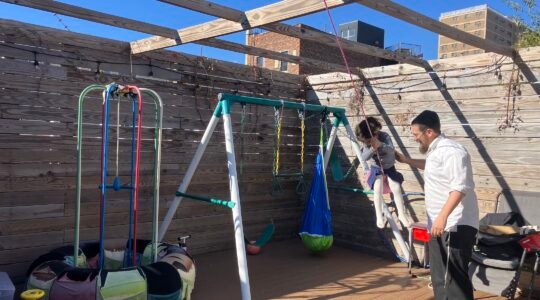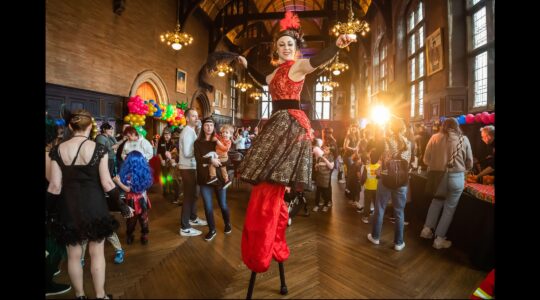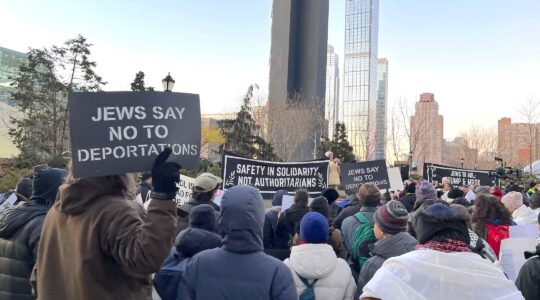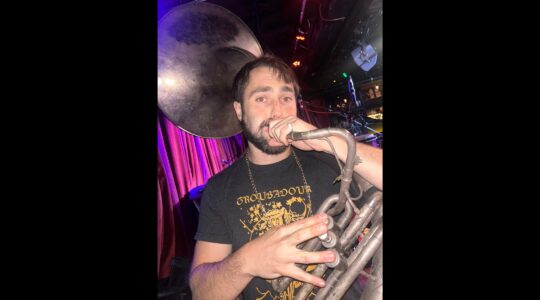Jerusalem — The separation of religion and state, be it ever so beleaguered, remains a fundamental tenet of American democracy. In Israel, it’s quite the opposite. A Reform or Conservative rabbi, for example, cannot not perform a legally binding wedding in the State of Israel, whose Chief Rabbinate, dominated by ultra-Orthodox leaders, has hegemony over Jewish marriage, divorce and conversion. Israelis who prefer a civil ceremony can hop over to Cyprus (or Vegas, to be properly wed by an Elvis impersonator.) The prohibition, in most of the country, of public transportation on Shabbat means that non-Orthodox Israelis who can’t afford cars or taxis can’t go to the beach on their day of rest, except on foot.
Many Israelis regard this as religious coercion. Many other Israelis see it as a worthy, or at least tolerable, reflection of the Jewishness of the Jewish state. And legions of Jews believe that Sabbath observance is vitally important to the redemption, protection and survival of the Jewish People.
In the 17th century, the Puritans of Massachusetts imagined America as a Holy Land — their rhetoric abounds in biblical imagery, and their legacy endures powerfully to this day — but Israel is the real deal. “Dwelling in the Land of Israel is equal in weight to all the commandments of the Torah,” declared the ancient rabbis, commenting on a passage in Deuteronomy. (Cynical Israeli secularists might read their words as a free pass to ignore the other commandments, but this is not what the Sages intended.) Embellishing upon this principle, the 13th-century kabbalist Nahmanides — who in old age fled Spain for Palestine — spoke of “those who are privileged to dwell before the Holy One, Blessed be He, in his Land, for they are as those who see the King’s face.” Thus, “if they are heedful of His honor, it is beneficial to them and they are happy. However, if they rebel against Him, woe to them more so than to all other people, for they make war and provoke the King in His own palace.”
I’m no expert, but it seems to me that this religious logic helps explain why, for ultra-pious Israelis, desecrations of Jewish law — as their rabbis variously interpret it — are ultra-awful, and truly dangerous, when committed in Israel. Hence the hysteria over female tzniut (modesty) or women reading Torah at the Western Wall, and the rock-throwing at cars on Shabbat, and the harassment of archaeologists who unearth Jewish graves, and so forth. American Jews watch from afar with horror as an 8-year-old girl, a child of Modern Orthodox American immigrants in Beit Shemesh, is spat upon and called a prostitute by ultra-Orthodox fanatics outraged by her attire. And how can a democratic state allow public sidewalks and buses that segregate men from women? Regardless of their differing views on Obama or the Arab Spring, Zionist settlement of Samaria or Israeli occupation of Palestinian land, many American Jews who pay attention to religious issues in Israel are often alienated and repelled by what they see.
Needless to say, there are wide and deep divisions among the haredim — “the fearful ones,” as the ultra-Orthodox are called in Hebrew, by themselves and others. Not all are equally extreme; certainly most would not spit at little girls — or priests, as sometimes happens in Jerusalem. Yet on the whole, even as they are amply supported by the public purse, they do not recognize, for religious reasons, the legitimacy of the State of Israel, whose founders brazenly presumed to gather the Exiles and re-establish Jewish sovereignty prior to the coming of the Messiah. For this reason, haredim do not, on principle, observe such civic rituals as standing at attention when sirens are sounded on Yom HaShoah or Yom HaZikaron (Memorial Day), or celebrate Independence Day, or sing the national anthem, “Hatikvah.”
A great many Israelis are offended by this willful disregard of national norms, and their resentment is exacerbated by the fact that less than half of haredi men have joined the workforce, and only 16 percent of draft-age haredim — a recent improvement over past years — serve in the IDF. Periodically, secular politicians seek to remedy the imbalance through legislation — and this is one of those periods, the Supreme Court having lately invalidated an Israeli law exempting haredim from the draft.
In Israel’s fractious parliamentary system, haredi parties have traditionally supported the ruling coalition, and the government, fearful of losing power, has lent its support to the haredi agenda. But now, as a result of the “May surprise” in which the 28 Knesset members of the Kadima party, led by Shaul Mofaz, joined the Netanyahu government, all bets are off. With a supermajority of 94 seats, Prime Minister Netanyahu could sustain his coalition even if the haredi parties bolted. The government plans to enact a draft-reform law this summer, and to that end has appointed a 10-person panel to study the issue and make recommendations. Predictably enough, the ultra-Orthodox parties refused to send official representatives to serve on the committee that poses a threat to their values and their voters’ way of life.
♦
To get a first-hand inkling of the haredi point of view, I took a long walk, on a pleasant morning in late April, up Emek Refaim and King George and past Jaffa Road, to the corner of Rehov Yehezkel and Rehov Meah Shearim, the very heart of ultra-Orthodox Jerusalem. It was Yom HaZikaron. I arrived at about 10:50 a.m., and a TV camera was set up at the intersection, poised to capture the annual transgression of haredi citizens who would soon ignore the siren. At two minutes to 11, an elderly, twinkly-eyed chasid approached me, holding a book: a slim compendium of hymns and laws of Shabbat. His father had edited this book, he said — would I care to buy it? I gave him some money, he gave me the book, and then, feeling entitled to an answer, I asked him a question: Why do haredim refuse to stand in memory of the Israeli soldiers who fell?
“People who want to stand, stand,” he said. “People who don’t, don’t. This siren is not something Jewish. We do other things, we study Torah, recite Psalms.”
And then he said: “We take care of you, and you take care of us.” In other words: the State provides money and an army, but true protection comes from God, and the haredim, through their piety and prayer, ensure that protection. A fair deal, in his view. And who am I to prove him wrong?
The siren sounded. Most of the locals, the men in black, stayed put, but some carried on conversations, a few of them ostentatiously. One man wheeled a baby carriage in circles at the center of the intersection, screaming anti-Zionist slogans in Yiddish. A couple of young guys pranced around. A fellow in a skullcap — a religious Zionist — ran up and knocked the black hat off a haredi who marched across the street carrying a cardboard sign. The siren died down. “Hagigah,” grinned the old man, squeezing my hand: What a show. Then he blessed me with wishes for the coming of the Messiah, and went on his way.
♦
On that very same day, the Israeli newspaper Maariv published an extensive interview with President Shimon Peres, a few lines of which were quoted in The New York Times: “Israel, mathematically or tangibly, should not have been established. Prior to the War of Independence, there was no chance. We were 650,000, they [Arab nations] were 40 million. They had seven armies, we had barely 5,000 soldiers. … So tangibly we were on the brink of collapse, but we won anyway, thanks to hidden powers. Ever since, for all of my life, I have tried to understand those immeasurable powers.”
In Hebrew, Peres used the verb lefa’neyach, which means more than just “to understand.” Deriving from “Tzafnat Paneach,” the Egyptian name given to Joseph, the dream-interpreter, by Pharaoh (Genesis 41:45), it means to decode or decipher, as befits “hidden powers.” What did Peres mean? (He referred to the same “hidden powers” in an Independence Day TV interview with Israel’s Channel Two.) From the sound of it, he is on the same mystical page, in this regard, as the old man I met in Mea Shearim — as are most Israelis, to one extent or another.
The 89-year-old president, a protégé of David Ben-Gurion, is a living link with Israel’s founders, secular Jews who never let go of the notion that Jews are God’s chosen people. Israel’s Declaration of Independence, broadcast to the world in May 1948, speaks of the Bible and its prophets, the “redemption of Israel,” and “our trust in the ‘Rock of Israel,’” a euphemism designed to be palatable to Jews of all stripes. Like America, Israel is a nation blessed by God. How could a Jewish state be otherwise?
This past January, the Israel Democracy Institute and the Avi Chai-Israel Foundation published a survey of “Beliefs, Observance, and Values of Israeli Jews.” Seven percent of Jewish Israelis defined themselves as haredi, 15 percent as Orthodox (“dati” or “religious,” in Israeli parlance) 32 percent as “traditional,” 43 percent as “secular, not anti-religious,” and 3 percent as “secular, anti-religious.” At the same time, only 16 percent said they do not observe religious tradition at all.
According to the poll, 80 percent said they believe (either “believe wholeheartedly” or “believe but sometimes doubt”) that “a higher power governs the world,” and 70 percent believe that Jews are the Chosen People. Thirty-seven percent — way more than the sum of haredim and Orthodox Jews — agreed that “a Jew who does not observe the religious precepts endangers the entire Jewish people.” Sixty percent — who apparently include secular Jews — believe in “the World to Come and life after death.” And a whopping 85 percent believe that “good deeds are rewarded,” and 79 percent that “bad deeds are punished.”
All of which goes to show that in terms of belief, the sharp, journalistically convenient dichotomy between “religious” and “secular” in Israel is nearly meaningless. It underscores the fundamental dissimilarity between American Judaism and Israeli Judaism. It has long been remarked that Israeli Jews are “Catholic Jews” — often lapsed or lax or selective, but Orthodox deep down — while American “Protestant Jews” are pluralistic denominationalists.
At the end of the day, when it comes to God, people don’t like to take chances, and Israelis, of all people, can’t afford to. The so-called “secular” public may fume at the intrusions of religiosity in many aspects of public life, and grouse that Jerusalem is turning “black,” yet remain oddly content to cede authenticity to the strictest practitioners of the ancestral creed. As Woody Allen memorably wrote, in a witty reprise of Pascal’s famous wager: “I don’t believe in an afterlife, although I am bringing a change of underwear.”
Stuart Schoffman is a fellow of the Shalom Hartman Institute in Jerusalem and a member of its Engaging Israel project. His translations from Hebrew include books by David Grossman, A.B. Yehoshua, and Meir Shalev.
The New York Jewish Week brings you the stories behind the headlines, keeping you connected to Jewish life in New York. Help sustain the reporting you trust by donating today.




